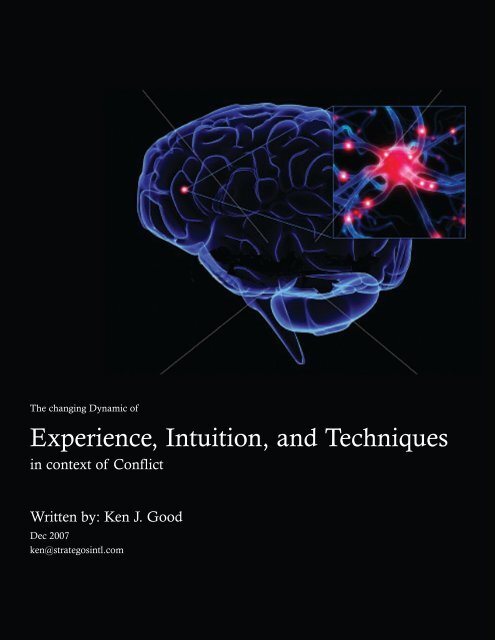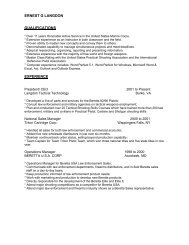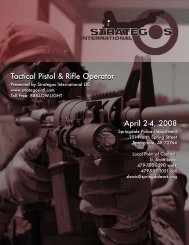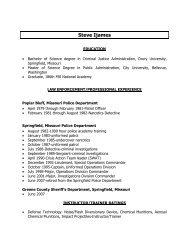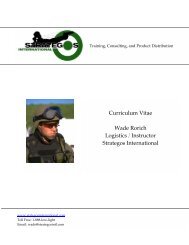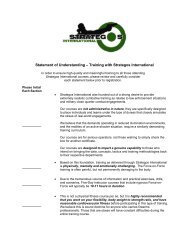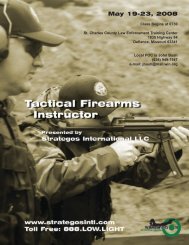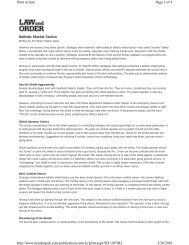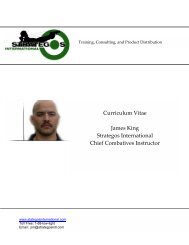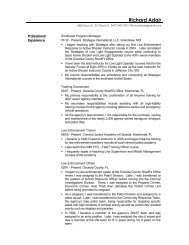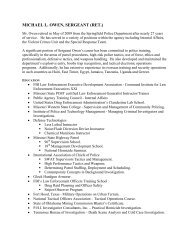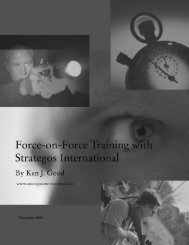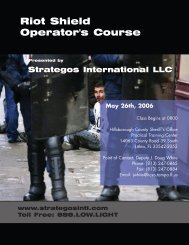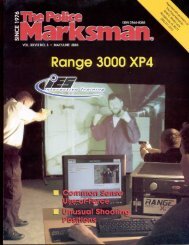Experience, Intuition, and Techniques - Strategos International
Experience, Intuition, and Techniques - Strategos International
Experience, Intuition, and Techniques - Strategos International
- No tags were found...
You also want an ePaper? Increase the reach of your titles
YUMPU automatically turns print PDFs into web optimized ePapers that Google loves.
The changing Dynamic of<strong>Experience</strong>, <strong>Intuition</strong>, <strong>and</strong> <strong>Techniques</strong>in context of ConflictWritten by: Ken J. GoodDec 2007ken@strategosintl.com
<strong>Experience</strong>, <strong>Intuition</strong>, & <strong>Techniques</strong> 2It’s counter-intuitive for men to place their bodies betweenh<strong>and</strong> grenades <strong>and</strong> hostages, knowing they themselves will die.Yet this is exactly what some of the soldiers of Russia did inBeslan for the hundreds of innocent school children caught ina horrendous situation at the h<strong>and</strong> of Chechnean terrorists.It’s counter-intuitive to take orders <strong>and</strong> hold your ground ina fierce battle when others are falling, <strong>and</strong> your internalprogramming is screaming out to run, run, run.Through the force of human will, training, fortitude, <strong>and</strong>self-sacrifice theses things <strong>and</strong> more are accomplished.I despise that which would undermine people of such character.From Unfamiliarity to Intuitive – It’s a Process (<strong>and</strong> it doesn’t come overnight)As a professional at arms, take the time to go over in your mind the skill sets you currently “own” so tospeak. Contemplate those things that you might be accomplishing with relative ease, quickly perceivingwhat is happening <strong>and</strong> doing what must be done with conscious thought, the very definition of intuitivebehavior.After you compile that list, note that almost everything on that list involves specific knowledge,techniques, <strong>and</strong> procedures, many of which can vary group to group. Regardless of the technique orprocedure you actually use to complete these tasks, were they all always “intuitive” to you?Did they initially “feel” right <strong>and</strong> all fall into place when you first went through the correct <strong>and</strong> acceptedprocedures as taught by the training staff? Then they were not intuitive at the time, were they?News flash here: Developing the optimal intuitive responses requires effort on your part, <strong>and</strong> in manycases specific, focused, <strong>and</strong> hard work. You are not hardwired to do many of the tasks required of youas a human being. However, you are highly adaptable <strong>and</strong> capable of a wide range of skill acquisition<strong>and</strong> tasking given the proper knowledge <strong>and</strong> training.Try to climb Mount Everest on “intuitive techniques” <strong>and</strong> see how far you get!Moving away from the world of conflict <strong>and</strong> crisis for a moment, I would like you to travel in your mindinto your vehicle on your way to work. You position your keys without effort, slip them into ignitionwithout conscious thought, turn over the engine, slip the transmission into gear <strong>and</strong> off you go.As you leave the familiar surroundings of your own neighborhood, to merge onto the faster roadways,you settle into a routine that from your conscious point of view is actually quite easy to manage.But if you actually took the time to make a comprehensive list of the processes, the adjustments, thevisual <strong>and</strong> audio cues, the literally life <strong>and</strong> death decisions you are making moment by moment, the listwould be staggering. It’s actually a complex network of possible orientations, decisions, <strong>and</strong> actions withserious consequences for error. Yet you drive your vehicle almost everyday into the dangerous dynamic,<strong>and</strong> for the most part return home safely without incident.
3<strong>Experience</strong>, <strong>Intuition</strong>, & <strong>Techniques</strong>If you can think back, the first time you sat behind the wheel this was not the case. You did not innatelypossess an intuitive set of techniques to address the procedure of driving. Step-by-step <strong>and</strong> day-by-daythe individual skills required were patched together. Over time, like millions of individuals before, youhave integrated all the necessary separate processes into a seamless whole. Most of the “work” is nowdone on a sub-conscious level.Now take this same task of driving <strong>and</strong> add one on-duty police officer, or one solider, or one securitycontractor in Iraq. In addition to driving the vehicle to get from point A to point B, that person wouldbe faced with the additional processes <strong>and</strong> pressures of radio traffic, loud noises, computer displays,previous briefings <strong>and</strong> emerging intelligence, all immersed in the unrelenting pressure of having to viewyour surroundings from a perspective of predator <strong>and</strong> prey as it relates to the surroundings.When something catches your attention in many cases it is fact your “intuition” (direct perception oftruth) that is cueing this up <strong>and</strong> sets in motion your next set of decisions <strong>and</strong> potential actions.Again, was this always so? When you first started the job, did you have this “intuitive” feel for whatwas happening in your surroundings? The answer is No; there is no way you could interpret the data<strong>and</strong> correctly analyze the complex <strong>and</strong> changing inputs like you do now. Why is that?Please review this short PowerPoint Presentation that was circulating on the Internet:http://strategosmedia.com/presentations/Stances.pptThese images of course come from actual gun battles in Liberia. Humorous, yes, but are we toencourage others we train to fight like this because these types of “intuitive” techniques <strong>and</strong> movementsare revealed in battle.I could make a powerful argument using pseudo-scientific words, leading language <strong>and</strong> statistics toencourage you to use these “intuitive” techniques.I think my point is made. It’s ludicrous to follow the do only what comes “natural” crowd. What youneed to know <strong>and</strong> execute just might involve complexity <strong>and</strong> underst<strong>and</strong>ing.Proper training over time leads to proficiency, period. There is NO WAY around it. If you run acrosssomebody claiming to have a wonder intuitive-approach curriculum, I would be exceptionally cautious.
<strong>Experience</strong>, <strong>Intuition</strong>, & <strong>Techniques</strong> 4“If it's intuitive, by definition, out of the gate, as it were, it's not taught. It's inherent in the body'sphysiology. Hence, this “counter-intuitive techniques” position would imply that what you are doing iscounter to what "inheres" within one's basic apparatus. This analysis is very similar to the old "instinct"proposition, e.g., that there are certain shooting positions that are "instinctual." Instinctual means thatsome given behavior is "species specific," capable of being demonstrated with maximum proficiency at bestwith no learning w/ respect to how to do the behavior <strong>and</strong> at worst, demonstrating full competency w/ onetrial to acquisition.” - Dr. Anthony SemoneLet me give you some basic practical examples that should jump right out at you:You are driving your vehicle at a fairly high rate of speed in the mountains,cliff on the outside of the corner. Suddenly your vehicle looses tractionbecause it hits a relatively small patch of “black ice”What would a br<strong>and</strong> new driver do intuitively?Answer: Intuitively grab onto the steering wheel <strong>and</strong> slam on the brakescreating further lose of traction. What would be the consequence?What would an experienced driving instructor, racecar driver or anybody whospends time on the ice do immediately <strong>and</strong> intuitively?You are learning to fly a small single engine aircraft, you are just rolling of therunway on takeoff <strong>and</strong> the plane suddenly stalls (no more lift) <strong>and</strong> begins tolose altitude.What would a br<strong>and</strong> new student pilot do?Answer: Intuitively <strong>and</strong> immediately, pull up hard on the controls in a fruitlessattempt to keep the aircraft from going down…dead in a few seconds.What would a more seasoned pilot intuitively do? Answer: Push down on thecontrols to change the angle of attack on the wings so that the aircraft would fly<strong>and</strong> not fall out-of-control to the earth. Once the aircraft is flying it can berecovered, preventing a sudden collision with the earth.What does somebody who has never been punched in the face intuitivelydo when they perceive that a threatening punch in coming their direction?Answer: Cringe <strong>and</strong> get hit anyway.What does an individual who has been trained to see <strong>and</strong> counter a punchintuitively do in the exact same situation? You get the idea.The fact of the matter is that in each <strong>and</strong> every case, the initial, predictable“intuitive” responses of inexperienced, unknowledgeable <strong>and</strong> unskilledindividuals leads to severe injury or death. But the trained, knowledgeable <strong>and</strong>skilled individuals have a much greater probability of escaping from their dangerous situations to liveanother day.
<strong>Experience</strong>, <strong>Intuition</strong>, & <strong>Techniques</strong> 6“ Veteran officers especially are experts at spotting body language signals<strong>and</strong> verbal cues that are precursors to nefarious intent”Lt. Jim Glennon, Lomard Ill. Police Department<strong>Experience</strong> <strong>and</strong> <strong>Intuition</strong> are co-partners enhancing your capabilities to prevail.Let’s take a short detour into exactly how you gain experience, as it is an interesting interplay.In some cases, you are told or shown something by someone who has done it before <strong>and</strong> lives to tellthe tale. On this basis alone they have X amount of credibility. That being said, right then <strong>and</strong> there, asthe new information is inbound, you go through an internal cross-checking/validation of what you arehearing or being shown. It goes into one of three piles; Reject, Accept, or to be Verified.The more experienced individual (the trainer) is trying to plow themental ground for you so that you (the trainee/student) don’t have towork so hard to break through the hard surface layer.Oftentimes, especially in the realm of tactical training, this presentationis expressed in the form of a technical sequence or procedure. As thetechnique is queued up to the thinking man, the immediate questionsshould include:How difficult, complicated, lengthy, <strong>and</strong> repeatable is thetechnique or procedure being shown?What time frames are involved to transfer this particularsequence to another so that they have competency with it?How does this stack up with what I already know tobe true or useful?Is this better or worse that what I am currently utilizingto solve the situation?In other cases, nobody told you or showed you anything, in the course of the presentation of life youwere thrust into an unfamiliar situation <strong>and</strong> you lived to tell the tale. You have new experience.You know the proverb, “Good judgment comes from experience, experience comes from bad judgment”.When someone tries to convince you that this is “intuitive” <strong>and</strong> that is not, your first counter questionshould be, “For whom? A 2-year old, an “average” person, or a physically fit / intelligent / diligent /constantly training with a view to improve / combat experienced individual?”To say that sets of techniques which have been validated in actual combat are intuitive or not intuitive forany given population is stating too much. There are quite a few valid approaches that achieve the desiredeffect. It has been my experience that folks who claim they are the only ones who have cracked the codeare usually full of bovine excrement.A more valid statement would be, “I disagree with the following approach because of A, B, <strong>and</strong> C.I have found in my personal experience that….D, E, <strong>and</strong> F are more effective because…”
<strong>Experience</strong>, <strong>Intuition</strong>, & <strong>Techniques</strong> 8Creating a motivating environment is exceptionally important.Can you do what you want your audience to do?Can you step up <strong>and</strong> demonstrate on dem<strong>and</strong>? If you can’t, I would stop right there <strong>and</strong> find somebodywho can! The ability to tell <strong>and</strong> show as opposed to just tell is the difference between night <strong>and</strong> day.Assess the resources required to achieve those objectives <strong>and</strong> ultimately accomplish the goals.What is available? I.E. Internal expertise/instructors, facilities, expendables, <strong>and</strong> the all-important componentof time required for initial competency <strong>and</strong> maintained competency of those technical skills <strong>and</strong>knowledge.Pour all this into the blender <strong>and</strong> assess the realistic probabilities of getting to the desired destination.If you cannot achieve the goal, then the harsh reality of “I can’t get there from here” sets in. You canfight/lobby for more resources, look for a better use of the allotted time to still achieve the goal,or reassess your goals <strong>and</strong> expectations.That being said, fight <strong>and</strong> fight hard internally <strong>and</strong> externally to keep your goals <strong>and</strong> expectations high.Do not give up easily.In larger organizations, if you can effect a small degree of change you have accomplished something.Overtime that new trajectory you created will pay dividends.It’s a process that lives <strong>and</strong> breathes if you will. You should maintain a student’s attitude your whole life,or much will pass you by. That being said, you should be sensibly critical, but not overly hostile, to newideas. Let your mind meditate on them until they either become workable or irreconcilable.For the ones you keep, be willing to let them go if a simpler, more reliable one can take its place.Maybe the new concept or technique is an augmentation of something else that is fairly solidified.In conclusion, your repertoire <strong>and</strong> your responses are shaped, exp<strong>and</strong>ed <strong>and</strong> contracted by constanttraining <strong>and</strong> personal experience in the environment you work in. They change over time.The argument that we should only do what is initially intuitive <strong>and</strong> easy falls so desperately short of anysound reason.<strong>Techniques</strong> are neither “intuitive” nor “counter-intuitive” in <strong>and</strong> of themselves. They have context <strong>and</strong>life within framework of human perception <strong>and</strong> capability.They are useful or non-useful, validated or invalidated by a completely different set of criteriavarying from individual to individual, from group to group, <strong>and</strong> from mission to mission.Don’t let anybody tell you otherwise!
References:Gary Klien, “<strong>Intuition</strong> at Work” by Gary Klein, Currency; 1st edition (December 24, 2002), ISBN-10: 0385502885Malcom Gladwell, “Blink: The Power of Thinking without Thinking”, Little, Brown <strong>and</strong> Company; 1 edition (January 11, 2005),ISBN-10: 0316172324John Giduck , “Terror at Beslan: A Russian Tragedy with Lessons for American Schools”, Archangel Group, March 2005,ISBN-10: 0976775301Ken Good, “Who is Training Whom?”, See: http://www.strategosintl.com/pdfs/Who-is-Training-Who.pdfLt. Jim Glennon, “<strong>Intuition</strong> on the Street: Harnessing the Power of the Sixth Sense”http://www.policeone.com/health-fitness/articles/1639260/I would like to personally thank Sgt. Chuck Haggard of Topeka Police Department for his support in the preparation of this article.His personal experience training policeofficers served as an excellent feedback <strong>and</strong> verification sounding board as I am always checking mysanity.Additionally, I would like to thank Anthony Semone PhD for reviewing my writing <strong>and</strong> offering his powerful <strong>and</strong> insightful perspective onthings. Dr. Semone has amassed considerable education, experience <strong>and</strong> training within a broad range of psychological disciplines. In doingso, he has afforded himself the ability to work within the fields of Forensic Psychology, Clinical Neuropsychology, Clinical Psychology, <strong>and</strong>Police Psychology.


